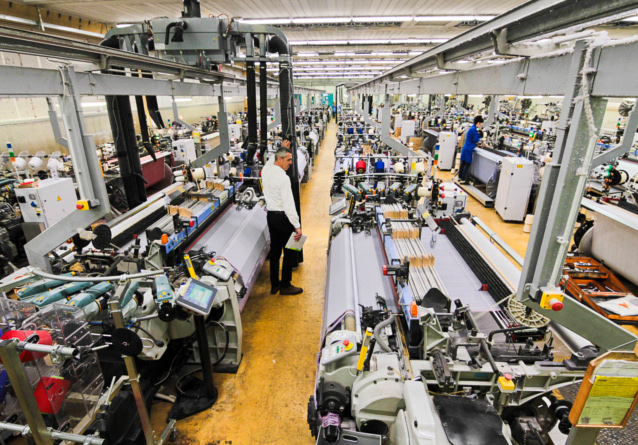✕



Interview with Silvio Albini, fifth-generation current president of the Albini cotton factory, leading the company with his brothers Andrea and Stefano and cousin Fabio.

Please describe the identity, history and values that underpin your company.
Let's start with who we are, what we do and some numbers. Albini Group is the largest European manufacturer of cotton fabric for men's and women's shirts for the mid-high range on the global market. We export to 80 countries around the world for top shirt makers and fashion houses, with a turnover of 148 million euros last year. We have 7 factories and 1380 employees. Founded in 1876, the company is currently headed by the 5th generation of heirs: me, my brothers Andrea and Stefano, and our cousin Fabio. The company has survived two world wars, the great depression, the textile crisis and above all the growth of developing countries on the apparel market, particularly China, which means that even in hard times like recent years, growth is not impossible. However, it is essential to ensure that products are of the highest quality, and this has been a characteristic of our production since the company was founded. We have a real vocation for manufacturing, and experience has enabled us to reach a very high level of specialisation. Our aim is to combine the secular tradition which we have an obligation to respect and maintain, with innovation and the transformations that are essential in a constantly changing world, in terms of tastes and trends as well as technological advances. Another fundamental value for us, handed down by our predecessors, is respect for the client.
What is the USP for your products/services and what are the reasons for their success?
The first element of our success is the high quality of our products; we never compromise on raw materials or fabrication processes. We always offer contemporary and modern products and we constantly update even the most classic fabrics and garments – contrary to popular belief, the industry is dominated by constantly-evolving trends. We also offer customers exclusive and customised products on request, and a sample service. We produce many types of fabric through constant innovation, and offer more than 4000 well-segmented variants, all available in stock for fast delivery. And when they are unavailable, for example in the case of particular products or large quantities, we can guarantee a quick response; another factor for success in an increasingly competitive market. We have the capacity to handle large batches in a very short time, and our flexibility is particularly appreciated by customers. We have also introduced an “ingredient branding” activity that differentiates our fabrics from those of our competitors, through labels, pendants and working with our customers to enhance fabric components, because it's worth noting that we don’t produce garments, only fabrics. Last but not least, tracking our products is very important. By controlling the entire production cycle, we can ensure sustainability.
What are your growth strategies, challenges and vision for the future?
We aspire to growth even though we operate in a highly competitive industry, and that’s why we are working in a number of different areas. First of all, we are thinking of increasing the penetration of our typical products in some countries, particularly the Far East.
Particular efforts are being devoted to new business models, such as online and multichannel distribution, offering custom lines for clients, and the possibility of meetings at their own offices.
Another important growth area linked to our ambition to become a global leader is supplying small cuts for tailor-made shirts. We currently have two hubs, one in Italy that covers the whole world except the Far East, and one in Hong Kong, where we deliver up to a thousand pieces per day.
We are also making commercial efforts in the world of women's fashion, a sector that is going well and is perhaps less competitive than men's. In this area, we are exploring new possibilities in terms of fabrics, in particular linen, which is elegant, eco-friendly and lightweight, and is the natural fibre we use most widely after cotton. Then there’s lightweight denim, which can be used in the production of many types of garment and in which we aim to become a global leader. Since 2012, we have also had a division dedicated to the production of yarns, one-third of which is used by Cotonificio Albini, and two-thirds sold on the market. We are thus moving into the knitwear industry, which is growing faster than shirt-making, and which could therefore represent a possible area for development.
Finally, there’s our start-up, Albini Energia, an autonomous company not strictly related to textiles that enables us to produce a small amount of alternative energy for our plants, which we are using to work on designs for new textile facilities around the world. We are also extending the experiment to other Italian companies that operate in various sectors, not just textiles. In short, the growth prospects go far beyond our core business.
How far does the company consider innovation a strategy for growth?
The market is highly competitive and constant innovation is crucial if we want to differentiate ourselves from our competitors. This includes both style tendencies and the various processes that take place at every stage of the textile industry and over which we have direct control, from researching raw materials to weaving techniques. In particular, there is a growing demand for innovative fabrics from the United States, such as non-iron fabrics and fibres with natural elasticity. Innovation in production processes also means sustainability - the real challenge for a capital-expensive and energy-expensive manufacturing business like ours. This process is gradual and we have started it together with our more perceptive customers.
What does "business internationalisation" mean for you today? Exports, outsourcing, partnership, or a combination of these?
We are definitely an internationalised company. Not only do we export 70% of sales to more than 80 countries worldwide, but a significant proportion of the remaining 30% that we sell in Italy is also exported indirectly. We own 3 overseas establishments, one in the Czech Republic and two in Egypt. The latter have enabled us to get closer to the raw material, since Egypt is where the most beautiful cotton in the world is produced. We also have long-term collaborations with suppliers in Europe, Turkey and Asia. Without this international presence at all levels – production, sales and supplies - we would not have withstood the 2008/09 crisis.
What are your most important markets today? And what markets are you looking at with greater interest in the medium to long term?
The single most important market is definitely Italy, with its excellence in the clothing industry. However, we try to consider Europe as our home market, and there is still much to do in this respect. The biggest markets in Europe include France with its luxury market, then Germany, Scandinavia and the UK. We are pushing a lot in the United States, where we have opened offices in recent years, and in the Far East, where we have an office and a distribution warehouse for custom fabrics.
What was the most important project or time for your company and for consolidating it?
There have been two important moments in our history. First of all, the transition of management to the fifth generation in the late '80s and early '90s, which was a very positive process rather than a moment. We have demonstrated that we can carry on the business and that the textile industry is not a sector destined to die, but has enormous potential for growth. The other event I’d like to mention is the acquisition of three British brands in the early '90s, including Thomas Mason. This acquisition was based on soft elements, but it was very important because entering the British market meant opening up the world for us and achieving a higher market ranking.
What does it mean for you to be part of the Elite Growth project?
The project name says a lot: Elite - a push for excellence, and Growth - the aspiration to grow. Elite Growth has offered us ideas for new growth prospects, in terms of quantity and above all quality. In particular, we are looking to transform ourselves from being a family business, which we still are in spite of the large size of the company, to a more structured organisation with an open management culture - “unfamiliarising” the company. We have met other interesting business operations in various meetings organised by Elite, which have offered us new cultural stimuli and important ideas. I personally deal with commerce, marketing and communication, and I found it very stimulating to get ideas in the modules devoted to these themes which I was able to study and analyse further.
In terms of finances, we are considering exploiting financing options provided by the European Investment Bank to some Elite companies through an instrument similar to the mini-bond. This would allow us to divest ourselves of pure bank credit - typically from Italian banks. We have also had meetings with consultancy companies that have provided useful tips on obtaining alternative funding. Finally, thanks to Elite's involvement, we have gained greater visibility, for which we are extremely grateful. But the most striking mark that this Elite experience will leave on our company is undoubtedly the overhaul of the Group's governance and direction, opening it up to external individuals and capital; a process that we have started but is not yet complete.

Would you tell your Inspiring Story?